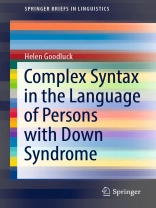This book examines the language abilities of persons with Down Syndrome who are able to read. The text defends the ‘delayed but not deviant view’ of linguistic abilities by examining a range of syntactic phenomena that develop at different points for typically developing children, and for which a similar overall pattern is found for persons with Down Syndrome. The volume also defends the ‘delayed but not deviant view’ against challenges arising from studies of the comprehension of definite pronouns. The study fits within a picture of linguistic abilities that is modular: skills with language do not emerge from other cognitive functions. It is an important source of information for readers in the departments of linguistics, speech and language therapy, and cognitive science.
Innehållsförteckning
Chapter 1: Introduction.- Chapter 2: The comprehension of ten syntactic structures by typically developing children.- Chapter 3: The comprehension of the ten syntactic structures by persons with Down Syndrome.- Chapter 4: Production data.- Chapter 5: Follow-up comprehension tests.- Chapter 6: Delayed but not deviant: A challenge.- Chapter 7: Conclusion.
Om författaren
Helen Goodluck has taught at universities in the United States, Canada and the United Kingdom. She is currently Professor Emerita at the University of York, U.K., and has held visiting positions in Sweden, the Netherlands, Spain and China. Her main research interests are in first language acquisition and language processing by adults. Helen has worked on a variety of languages, including Akan, English, Modern Irish, Serbian, Spanish and Greek.












